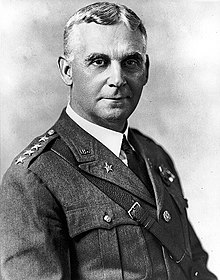Charles P. Summerall
Charles Pelot Summerall (born March 4, 1867 in Blount's Ferry , Florida , † May 14, 1955 in Washington, DC ) was an American general and Chief of Staff of the Army from 1926 to 1930. After his active years, he was long President of the South Carolina Military College , The Citadel .
biography
Summerall was the son of a former Confederate soldier and grandson of a slave owner in one after the Civil War born impoverished family. From 1882 to 1885 he attended the Porter Military Academy in South Carolina. At the age of 19, he won a local congressman's scholarship to enter the United States Military Academy at West Point. He completed his training there in 1892 in the upper third of his class. He was first assigned to the 1st Infantry Regiment and transferred to the 5th Artillery Regiment in 1893 . Employment as a garrison officer in California and Fort Hamilton , New York followed. As first lieutenant he served in the Philippine-American War from 1899 to 1900 before he was assigned to the American contingent to suppress the Chinese Boxer Rebellion . In 1901 he was promoted to captain .
Uses in Washington State and Alaska followed before Summerall was appointed as an artillery tactics instructor at West Point Military Academy in 1905, where he served until 1911. He was then promoted to major and took over the field artillery of the maneuvering division stationed in San Antonio , Texas. From 1915 to 1917 he served in the Militia Bureau of the War Department , where he was deputy head of the National Guard artillery . He was also a member of the Ordnance Board , later the Board of Ordnance and Fortification . During this time there were quick promotions up to brigadier general in August 1917. Previously, as an artillery expert, he was a member of a commission under Chauncey Baker to Europe, which should make proposals for the future participation of the USA in the First World War .
Back in the United States, Summerall became the commander of an artillery brigade in the 42nd Infantry Division with which he transferred to Europe. Shortly after his arrival, in December 1917, he became commander of the 1st Field Artillery Brigade of the 1st Infantry Division . In July 1918, after the Battle of Cantigny , he succeeded Robert Lee Bullard as commander of the division after he had received a corps command. He led the division, promoted to major general, in three major operations: the battle of Soissons , the battle of St. Mihiel and at the beginning of the Meuse-Argonne offensive . He was placed on October 12, 1918 by General Pershing at the head of the V Corps , with whom he carried out costly attacks in the final days of the war, which later earned him criticism.
After the end of the war Summerall was Commanding General of the IX Corps in February 1919, and from May of the IV Corps. From July to August 1919 he was a member of an inter-allied commission that was supposed to report on the situation in Fiume , and then a member of the American peace delegation in Paris . At the end of September 1919 he again took over the 1st Division in Camp Dix, New Jersey, which he led until 1921. In August 1921 he became the commanding general of the Hawaiian Department and held this post until the fall of 1924. He then became the interim commanding general of the VIII Corps Area with headquarters in Fort Sam Houston , Texas, and in January of the following year of the II Corps Area in New York . In late 1925 he sat before the military trial against Billy Mitchell . From November 1926 to 1930 he was Chief of Staff of the Army. In February 1929, he was promoted to (temporary) four-star general . He resigned from active service as a general in March 1931.
In retirement he became president of the Citadel , the military college of the state of South Carolina. Due to poor health, he gave up his post in June 1953. He died two years later in the Walter Reed Military Hospital in Washington .
His awards include the Distinguished Service Cross , the Distinguished Service Medal , and the Silver Star with triple oak leaves .
literature
- Charles Pelot Summerall: The Way of Duty, Honor, Country: The Memoir of General Charles Pelot Summerall. Edited and annotated by Timothy K. Nenninger, University Press of Kentucky, 2010.
Web links
- Career data on history.army.mil (excerpt from Commanding Generals and Chiefs of Staff, 1775–2005 )
Individual evidence
- ↑ James J. Cooke: Billy Mitchell. Lynne Rienner, 2002, p. 187 ff.
| personal data | |
|---|---|
| SURNAME | Summerall, Charles P. |
| ALTERNATIVE NAMES | Summerall, Charles Pelot (full name) |
| BRIEF DESCRIPTION | American General, Chief of Staff of the Army |
| DATE OF BIRTH | March 4, 1867 |
| PLACE OF BIRTH | Blount's Ferry , Florida |
| DATE OF DEATH | May 14, 1955 |
| Place of death | Washington, DC |
